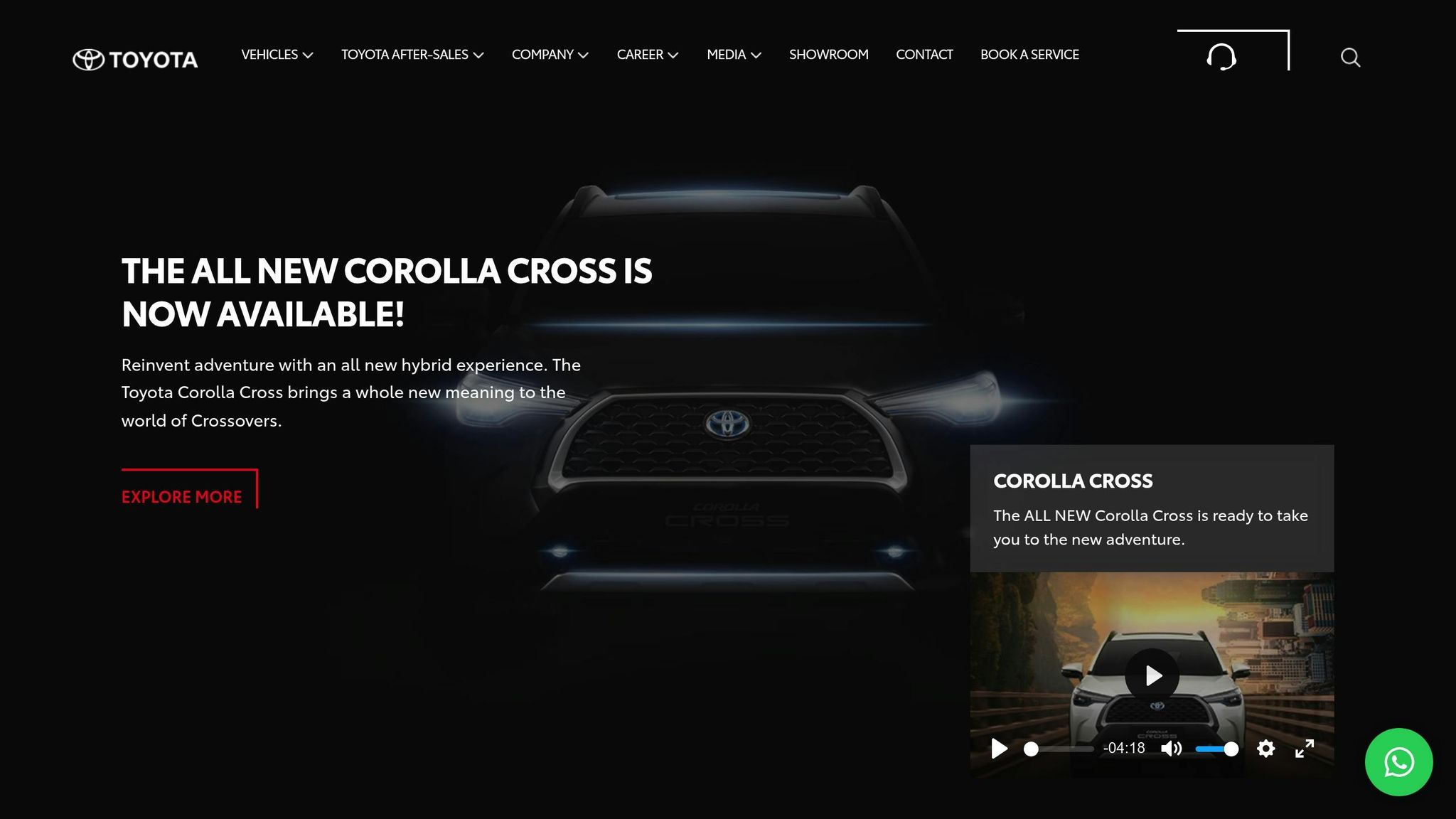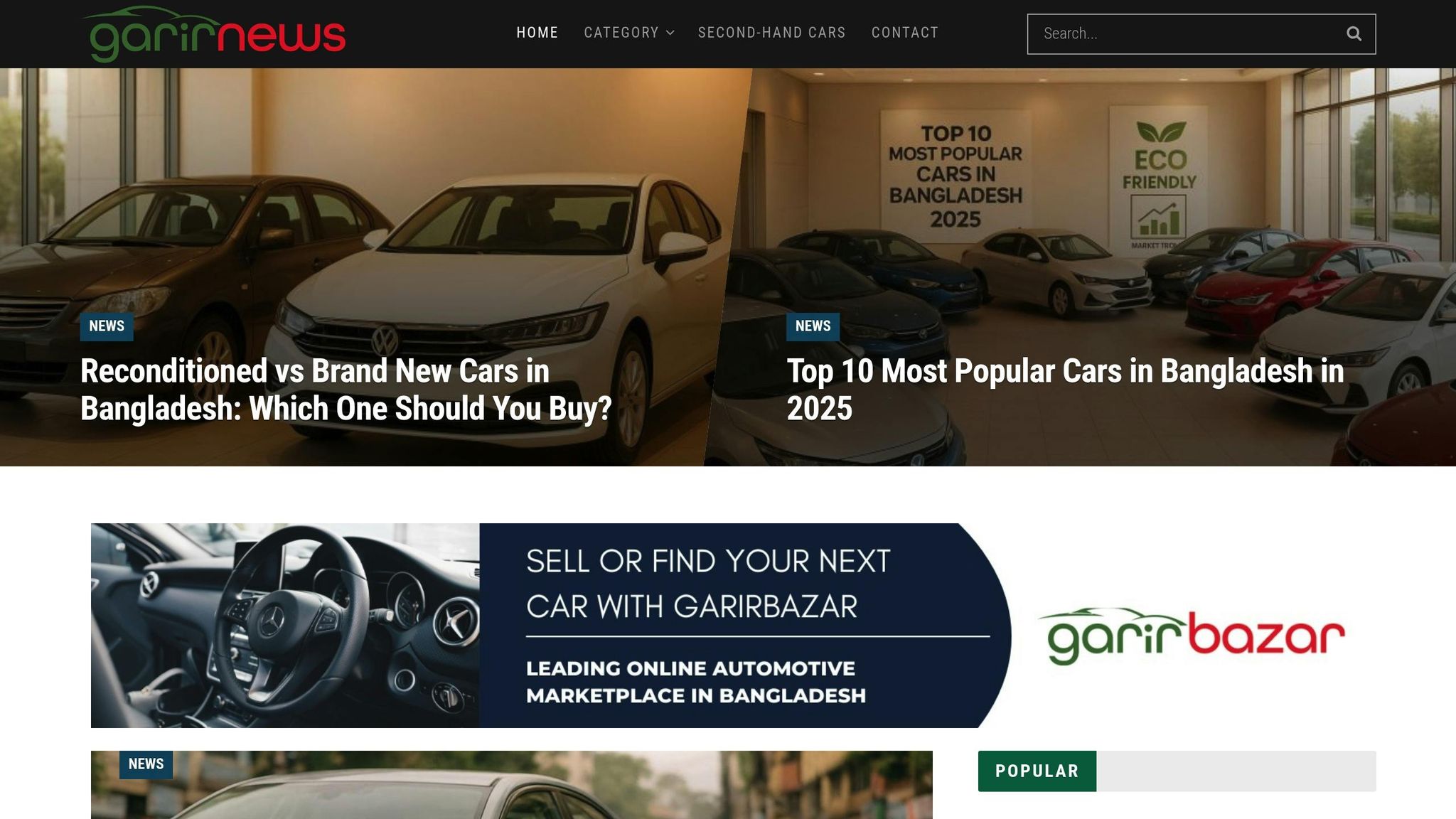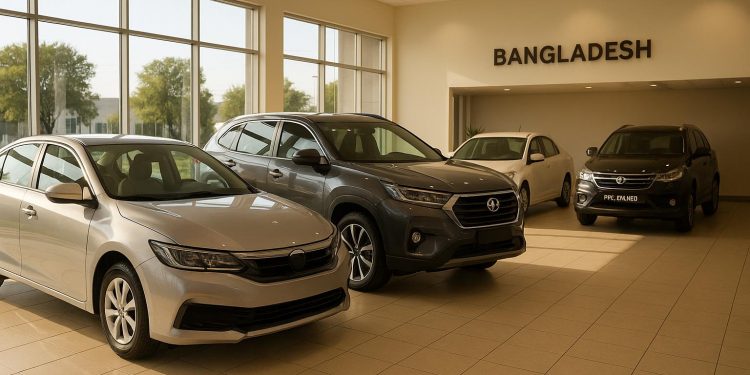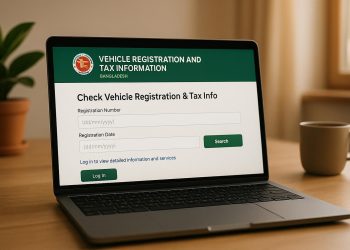Bangladesh’s car market in 2025 is shaped by rising costs, new tax policies, and shifting consumer preferences. Here’s what you need to know:
- Toyota dominates with 86% of car listings, and Dhaka accounts for 62% of all car sales.
- Reconditioned cars are the most popular (59%), followed by used cars (40%), with new cars making up just 1%.
- Most vehicles fall in the BDT 20-30 lakh (26%) and BDT 30-40 lakh (25%) price ranges.
- New tax policies, including a 25% tariff on new imports, have driven up prices, while reduced duties on hybrid vehicles offer some relief.
- Inflation (9.05% in May 2025) and a 30% depreciation of the Taka since the pandemic have further increased car costs.
- Used car market growth: Valued at USD 1.54 billion in 2025, expected to reach USD 2.17 billion by 2030 with a 7.10% annual growth rate.
Key price examples include:
- Budget Cars: Maruti Suzuki Alto 800 (৳8,23,902), Suzuki WagonR (৳16-20 lakh).
- Mid-Range Sedans: Honda City (৳22-25 lakh), Toyota Corolla (৳25-35 lakh).
- SUVs: Toyota RAV4 (৳65 lakh), Toyota Hilux (৳80-92 lakh).
- Luxury Cars: Toyota Camry (৳89 lakh).
Used and reconditioned cars remain more affordable options, with popular models like the Toyota Corolla Axio (৳16.8 lakh) and Toyota Premio (৳21.9 lakh). Buyers are advised to consider car condition, mileage, and long-term costs like fuel efficiency when making decisions.
Bangladesh Car Market Status in 2025
Economic Conditions and Market Changes
Bangladesh’s economy is grappling with challenges that directly affect car prices across all categories. Inflation remains a pressing issue, with the general inflation rate hitting 9.05% in May 2025, only slightly lower than the 9.17% recorded in April 2025. Meanwhile, non-food inflation climbed to 9.42%. These rising costs have made car ownership increasingly out of reach for many middle-class families.
Adding to the problem, the Taka has depreciated by nearly 30% against the US dollar since the Covid-19 pandemic. This has driven up the cost of importing vehicles and spare parts. Although the official exchange rate has been stable at BDT 122 per USD for the past five months, this stability has come at the expense of the country’s foreign exchange reserves.
"Over the past three years, various analyses have explained why inflation has increased in Bangladesh. While opinions vary, one consensus has emerged – the rise in the US dollar’s value." – Zahid Hussain, former lead economist at the World Bank’s Dhaka office
The foreign exchange reserve situation further complicates matters. In May 2025, Bangladesh’s reserves dropped to USD 25.8 billion, limiting the central bank’s ability to stabilize the currency. The Bangladesh Bank has been actively intervening in the forex market to prevent extreme fluctuations.
"We want to keep the forex market stable because neither a big rise nor a steep fall is a good indicator. If the dollar weakens too much, exporters and remitters feel discouraged and suffer losses." – Areif Hussain Khan, executive director and spokesperson for the central bank
These economic pressures – high inflation and a weaker currency – make it unlikely that car prices will ease anytime soon. Combined with government tax policies, the cost of owning a car continues to climb.
Government Rules and Import Taxes
The National Board of Revenue (NBR) has implemented a multi-layered tax structure that significantly influences car prices. Taxes are determined by engine capacity, creating wide variations in costs.
For instance, small cars with engines under 1,500cc face a total tax burden of around 128% of their CIF (Cost, Insurance, and Freight) value. On the other hand, luxury vehicles with engines over 4,000cc are subject to a staggering total tax burden exceeding 800% of their CIF value, making them unaffordable for most buyers.
Recent policy changes have further increased costs. The 2024-25 fiscal budget introduced an additional 25% supplementary duty and 15% VAT on MPs’ car imports. Additionally, the Advance Tax (AT) on imported items, including vehicles, was raised from 5% to 7.5%, further pushing up prices.
"Instead of catching VAT evaders, the government is punishing all importers. As a result, prices will rise the very next day." – SM Nazer Hossain, vice president of the Consumers Association of Bangladesh
For example, this tax hike adds BDT 1 lakh to the price of a car worth BDT 40 lakh. Buyers should brace for immediate price hikes following such policy changes.
Industry experts have expressed concerns about these measures. Md Shahidul Islam, a prominent importer and former vice president of the Bangladesh Reconditioned Vehicles Importers and Dealers Association, highlights a key issue:
"Once AT is paid at the import stage, it’s not collected again on local sales. The government gets nothing more."
Zaidi Sattar, chairman of the Policy Research Institute, also criticized the timing of these tax hikes:
"Instead of addressing weaknesses in VAT enforcement on local sales, the government is raising taxes on all commercial imports. This hurts the economy, especially as Bangladesh prepares for LDC graduation."
There are, however, some incentives for hybrid and electric vehicle buyers. The government has introduced tax benefits for hybrid and electric vehicles to promote their adoption. While preferential duties on hybrid imports are sparking interest in the premium market, these incentives are unlikely to offset the broader tax burdens.
Restrictions on used car imports also play a role. Although used cars typically have lower assessed values, leading to reduced duties, the government’s limits on older vehicle imports are nudging buyers toward newer, pricier options.
টয়োটা বাংলাদেশের সকল গাড়ির বর্তমান দাম ।। Toyota Car Price in Bangladesh 2025

New Car Prices in Bangladesh – July 2025
The new car market in Bangladesh is feeling the weight of economic challenges and increased taxes. These factors have led to noticeable price hikes, especially for large-engine models, which now come with an added cost of around ৳3–4 lakh.
Popular New Car Models and Prices
Budget-Friendly Options
For those seeking affordable options, the Maruti Suzuki Alto 800 is priced at ৳8,23,902 (OTR Dhaka). This compact car is ideal for first-time buyers who need simple, city-friendly transport.
Another popular choice in this category is the Suzuki WagonR, available for ৳16,00,000 – ৳20,00,000. Known for its compact design, spacious cabin, and fuel efficiency, it’s a practical pick for navigating Dhaka’s busy streets.
Mid-Range Sedans
In the mid-range sedan market, the Honda City (Grace) stands out with a price range of ৳22,00,000 – ৳25,00,000. This model combines style and functionality, offering a 1.5L hybrid engine, paddle shifters, a touchscreen infotainment system, and eco-assist technology.
The Toyota Corolla, a long-time favourite on Bangladeshi roads, is priced between ৳25,00,000 – ৳35,00,000. Its reputation for reliability, fuel efficiency, and low maintenance costs keeps it in high demand. According to Ruhin from CarModsBD, the Corolla remains a top choice for buyers due to these qualities.
Premium Segment
For those looking at premium sedans, the Hyundai Elantra is priced between ৳28,90,000 – ৳33,50,000 in Dhaka. Meanwhile, the Toyota Corolla Altis serves as a higher-end option, starting at ৳60,00,000.
SUV and Pickup Options
In the SUV category, the Toyota RAV4 is available for ৳65,00,000 (OTR Dhaka). It offers a blend of SUV capabilities and efficient performance. For those requiring a more rugged vehicle, the Toyota Hilux is priced between ৳80,00,000 – ৳92,00,000. With its 2.4L–2.8L diesel engines, 4×4 drivetrain, and high ground clearance, it’s built for tough conditions.
Luxury Vehicles
In the luxury segment, the Toyota Camry is priced at approximately ৳89,00,000. However, luxury car sales have taken a hit due to the dollar crisis and rising import costs. Mohammad Shahidul Islam, secretary-general of BARVIDA, commented:
"This decline isn’t just about one issue. The dollar crisis and soaring import costs are turning these cars into luxuries beyond the reach of even a select few among the well-off."
New Car Price Comparison Table
Below is a summary of the popular car models and their price ranges for quick reference:
| Car Model | Engine Type | Key Features | Price Range (৳) |
|---|---|---|---|
| Maruti Suzuki Alto 800 | 1.0L petrol | Basic transportation, city-friendly | 8,23,902 |
| Suzuki WagonR | 1.0L petrol | Compact design, dual SRS airbags, spacious cabin | 16,00,000 – 20,00,000 |
| Honda City (Grace) | 1.5L hybrid | Paddle shifters, touchscreen, eco-assist tech | 22,00,000 – 25,00,000 |
| Toyota Corolla | 1.8L hybrid/petrol | Reliability, dual airbags, ABS, 15–17 km/l economy | 25,00,000 – 35,00,000 |
| Hyundai Elantra | Various | Premium sedan features | 28,90,000 – 33,50,000 |
| Toyota Corolla Altis | Various | Higher-end sedan features | 60,00,000+ |
| Toyota RAV4 | Various | SUV capabilities, fuel efficiency | 65,00,000 |
| Toyota Hilux | 2.4L–2.8L diesel | 4×4 drivetrain, rugged performance, high clearance | 80,00,000 – 92,00,000 |
| Toyota Camry | Various | Luxury sedan features | 89,00,000 |
Market Trends and Challenges
The shifting economic landscape has significantly impacted new car sales in Bangladesh. Private car registrations have dropped by 36% compared to last year. Cars priced between ৳60 lakh and ৳70 lakh have seen sales fall by 50%, while vehicles under ৳50 lakh are now selling at just 60% of their previous levels.
Arif Khan, Managing Director of Motors Bay, shared his thoughts on the situation:
"What people don’t realise is that even those who can afford it are reluctant to spend because of the social scrutiny."
Used and Reconditioned Car Price Trends
The market for used and reconditioned cars in Bangladesh is on a steady rise. By 2025, it’s expected to be worth USD 1.54 billion, with projections reaching USD 2.17 billion by 2030, growing at a 7.10% annual rate. This growth is largely driven by the increasing cost of new cars, which pushes buyers toward more budget-friendly options. Reconditioned cars dominate the market with 59% of listings, while used cars make up 40%, reflecting the demand for affordability. Unorganised dealers currently hold a significant 64.39% market share in 2024, but organised players are gaining ground quickly, expanding at a 9.84% annual rate, thanks to the reach of digital platforms. These dynamics shed light on the factors influencing used car pricing.
What Affects Used Car Prices
Several factors determine the price of used cars, including brand reputation, model popularity, age, condition, and mileage.
The age of the vehicle is a key pricing factor. Cars aged 5-8 years account for 44.54% of sales, with buyers favouring moderate mileage between 40,000 and 80,000 km. Meanwhile, inventory with mileage under 40,000 km is growing at a 12.14% annual rate. There’s also a noticeable shift toward newer cars, with the 0-3-year age bracket growing the fastest at 9.32% annually.
Engine type and fuel efficiency are gaining importance in buying decisions. Gasoline-powered cars led the market with a 79.86% share in 2024, but battery-electric vehicles are emerging as the fastest-growing segment, advancing at a 13.24% annual rate through 2030. This shift reflects a mix of environmental awareness and rising fuel costs.
Currency depreciation also plays a role, as it increases the cost of imported vehicles and parts. Additionally, government regulations on vehicle age, emissions, and taxes significantly impact pricing trends.
Price Ranges for Common Reconditioned Models
In 2024, the price range of USD 5,001-10,000 captured 36.32% of the market, making it the most popular choice for Bangladeshi buyers. The USD 10,001-15,000 segment is also growing, with a 10.17% annual rate, driven by higher incomes and better financing options. Below are some current prices for popular reconditioned models:
- Toyota models remain top choices due to their reliability and resale value. For example:
- Toyota Corolla Axio G package (98,800 KM, 1500 CC): ৳16,80,000.
- Toyota Premio F Octane Use 2010 (62,000 KM, 1500 CC): ৳21,90,000.
- Mid-range sedans vary in price based on age and condition:
- Toyota Axio X 2013 (62,000 KM, 1500 CC): ৳17,40,000.
- Toyota Allion Red Wine with Power Seat 2013 (63,315 KM, 1500 CC): ৳24,70,000.
- SUVs and crossovers command higher prices:
- Honda CR-V Australian Version 2021 (19,000 KM, 1500 CC): ৳51,80,000.
- Nissan X-Trail with sunroof and 7 seats 2017 (44,797 KM, 2000 CC): ৳37,90,000.
- Luxury vehicles sit at the high end of the market:
- BMW 7 Series 745LE Xdrive M Sport 2020 (8,000 KM, 3000 CC): ৳2,25,00,000.
- Mercedes-Benz G-Class G63 V8 BITURBO 2023 (3,000 KM, 4000 CC): ৳12,50,00,000.
Used Car Price Comparison Table
| Vehicle Category | Model Examples | Year Range | Mileage (KM) | Price Range (৳) |
|---|---|---|---|---|
| Budget Sedans | Toyota Corolla, Nissan Bluebird | 2004-2008 | 58,000-140,000 | 11,80,000 – 16,70,000 |
| Mid-Range Sedans | Toyota Axio, Toyota Allion | 2010-2015 | 60,000-90,000 | 17,40,000 – 24,70,000 |
| Compact Cars | Toyota ist, Toyota Fielder | 2004-2016 | 66,000-85,000 | 13,25,000 – 20,99,000 |
| Family SUVs | Nissan X-Trail, Honda CR-V | 2014-2021 | 19,000-56,000 | 33,50,000 – 51,80,000 |
| Premium SUVs | Mitsubishi Outlander, Hyundai Creta | 2018-2023 | 16,000-56,000 | 32,00,000 – 45,50,000 |
| Luxury Sedans | BMW 7 Series, Mercedes G-Class | 2020-2023 | 3,000-8,000 | 2,25,00,000 – 12,50,00,000 |
Interestingly, used car prices are dropping at both retail lots and wholesale auctions. The average price of a used car stood at $25,512 in July 2025. This decline offers buyers a chance to find better deals, but evaluating the car’s quality and condition remains essential for making the right choice.
sbb-itb-a58e215
Main Factors That Determine Car Prices in Bangladesh
Understanding the key drivers behind car prices in Bangladesh is essential for buyers aiming to make smart decisions and for sellers looking to set realistic price points. The local car market has its own unique dynamics shaped by factors like government regulations, economic trends, and consumer preferences. Three major elements influence vehicle pricing here: engine size and government taxes, currency fluctuations and import costs, and fuel type and efficiency.
Engine Size and Government Taxes
In Bangladesh, the size of a car’s engine significantly influences its price due to the country’s tiered tax system. Cars with larger engine capacities face much higher duties, making them far more expensive. For instance, a compact car already carries a high tax relative to its CIF (Cost, Insurance, and Freight) value, but luxury vehicles face even steeper tariffs. Under the Supplementary Duty structure, vehicles with engine sizes between 2,001–3,000cc are taxed up to 200%, those between 3,001–4,000cc up to 300%, and engines over 4,000cc face duties as high as 350%. Additionally, cars with engine capacities of 1,500cc and above incur a registration fee of ৳25,000.
While the government does offer tax breaks for hybrid and electric vehicles, the relief is modest compared to the overall tax burden. As a result, smaller, more affordable cars dominate the market, while high-end luxury vehicles remain a niche choice for a select few. This tax framework is a major factor in determining car affordability and availability in the country.
Currency Fluctuations and Import Costs
Bangladesh’s heavy reliance on imported vehicles and components means that exchange rate changes have a big impact on car prices. When the Taka weakens against major currencies like the US Dollar, Japanese Yen, or Euro, the cost of importing cars rises. These increased costs are passed directly to consumers, making vehicles more expensive. For instance, global price hikes of 13.5% in the short term and 10.5% in the long term have added an average of $6,500 and $5,000 respectively to the cost of new cars.
As an import-dependent market, Bangladesh is particularly vulnerable to such shifts. Changes in tariff rates and currency depreciation can quickly drive up vehicle prices, making timing a crucial factor for buyers. Those who keep an eye on exchange rates and government import policies can often find better deals by purchasing at the right moment.
Fuel Type and Efficiency Effects
Fuel efficiency plays a major role in determining a car’s overall cost of ownership. Diesel vehicles, for example, are 15–30% more fuel-efficient than petrol cars, which can significantly lower running expenses over time. Other factors, such as fuel-saving technologies and lighter vehicle designs, also contribute to better efficiency. However, external elements like air conditioning can increase fuel consumption by 20%. Fortunately, Bangladesh’s warm climate means cold-weather impacts on fuel use are negligible.
Electric and hybrid vehicles are becoming increasingly popular, thanks to lower running costs and government incentives. These vehicles are particularly appealing to urban commuters and businesses looking to reduce their operational expenses. When considering a car, it’s wise to think beyond the purchase price and factor in long-term costs like fuel and maintenance. This broader perspective can help buyers make more economical choices in the long run.
Practical Tips for Car Buyers and Sellers
Navigating Bangladesh’s car market requires careful planning and an understanding of local conditions and regulations. Whether you’re buying or selling, these tips can help you make informed decisions.
Checking Resale Value and Car Condition
When considering a used car, a thorough Pre-Purchase Inspection (PPI) is essential. In Dhaka, professional PPI services start at around ৳2,500, a small price compared to the potential costs of unforeseen repairs. Here’s what to focus on during the inspection:
- Engine: Look for oil leaks and listen for unusual noises.
- Transmission: Ensure smooth gear shifts in manual cars.
- Electronics: Test all functions, including the infotainment system, power windows, and air conditioning.
- Chassis and Suspension: Check for signs of corrosion, misalignment, or unusual wear.
- Tyres: Verify proper tread depth and overall condition.
- Interior: Look for damage or unusual odours, which could indicate water damage.
A test drive is also crucial. Pay attention to suspension noise, braking performance, and any signs of tampering, such as odometer rollbacks or erased error codes.
Once you’re satisfied with the vehicle’s condition, ensure all legal documents are in order to facilitate a smooth ownership transfer.
Legal Requirements and Paperwork Process
Adhering to the Bangladesh Road Transport Authority (BRTA) guidelines is critical to avoid legal issues during a car sale or purchase.
"According to Bangladesh Road Transport Authority (BRTA) guidelines, if the ownership of motor vehicles is not transferred on time, legal problems will be faced in the case of buying and selling motor vehicles."
To transfer ownership, you’ll need to submit the following documents:
- A completed Transfer of Ownership Form
- TIN Certificate
- Registration Certificate
- An affidavit with photographs
- A clearance letter for vehicles with outstanding loans, if applicable
After submitting these documents, the BRTA will conduct a physical inspection, and a change of ownership permit will be issued. For imported vehicles, ensure all documents are in your name and start the process at least 2–3 months in advance to avoid delays.
Using GarirNews for Market Information

GarirNews is a valuable tool for staying updated on market trends and pricing. By tracking demand, price segments, and emerging trends – like the increasing interest in electric and hybrid vehicles – you can better time your transactions. For example, reconditioned cars make up 59% of all listings, with saloon cars accounting for 36%, followed by SUVs and MPVs.
Monitoring GarirNews regularly can help you spot pricing trends for popular brands like Toyota, Honda, and Nissan. Seasonal fluctuations often influence the market, and understanding these patterns can help you make smarter decisions.
Conclusion
The car market in Bangladesh is shifting gears, offering plenty of opportunities for buyers and sellers who stay informed. The used car sector is a prime example, with its market value expected to grow from ৳1.54 billion in 2025 to an estimated ৳2.17 billion by 2030. This growth highlights the increasing demand and potential within this space.
Key trends paint a clear picture of the market. Hatchbacks dominate with a 42.43% share, while gasoline vehicles remain the top choice at 79.86%. Buyers are leaning towards nearly-new vehicles (0–3 years old), prioritizing modern features without the hefty price tag of brand-new models.
For sellers, pricing smartly is crucial. The budget segment of ৳5,001–10,000 attracts 36.32% of buyers, but the premium market is also expanding as purchasing power grows. Factors like rising new car prices, easier access to credit through fintech, and stricter import rules for older vehicles are driving these trends.
Online platforms are playing a bigger role in car sales, though unorganised dealers still hold a significant 64.39% market share. Meanwhile, battery-electric vehicles are gaining traction, with a projected growth rate of 13.24% CAGR by 2030, presenting exciting opportunities for early adopters.
Policy changes also influence the market. Reduced duties on hybrid imports make premium models more attractive, while restrictions on older vehicle imports help maintain strong resale values for used cars.
When navigating this evolving market, resources like GarirNews can be invaluable. Use their tools to compare models, find deals, and follow the guide’s earlier advice on thorough checks and proper documentation.
Whether you’re buying your first car or upgrading, staying informed and acting decisively will help you make the most of Bangladesh’s dynamic automotive landscape.
FAQs
What impact have recent economic changes and tax policies had on car prices in Bangladesh in 2025?
In 2025, car prices in Bangladesh have been shaped by recent economic changes and revised tax policies. A 7.5% increase in import advance tax has pushed up the prices of imported cars. Additionally, updated regulations have imposed higher duties on vehicles with engines exceeding 2,500cc, making larger, fuel-powered cars noticeably pricier.
At the same time, electric and hybrid vehicles have become more accessible due to tax incentives designed to promote environmentally friendly options. These adjustments are steering the market towards greener choices, while traditional fuel-powered cars, especially those with larger engines, are facing steep price increases.
What factors are driving the growth of the used and reconditioned car market in Bangladesh?
The used and reconditioned car market in Bangladesh has been expanding steadily, driven by several important factors. For starters, the rising cost of new cars has encouraged many buyers to consider more budget-friendly alternatives like used vehicles. On top of that, the availability of financing options through fintech platforms has made car ownership more accessible to a larger segment of the population.
Government regulations, such as limitations on importing older vehicles, have also played a role in boosting the demand for reconditioned cars. Meanwhile, the country’s fast-paced urbanisation, improving economic conditions, and a growing desire for affordable yet modern cars are further propelling this upward trend.
What should you check when buying a reconditioned car in Bangladesh, and how do pricing trends affect your decision?
When buying a reconditioned car in Bangladesh, taking the time to inspect its condition is crucial. Focus on important components such as the engine, transmission, brakes, and suspension to ensure the vehicle is in good working order. Don’t forget to review its maintenance records and verify the mileage – this helps uncover any potential issues that might not be immediately visible.
It’s also wise to stay informed about local pricing trends, as they play a big role in your decision-making process. Reconditioned cars are generally more budget-friendly than brand-new ones, but their prices can fluctuate due to factors like market demand, changes in import rules, and currency exchange rates. Keeping an eye on these trends not only gives you a better idea of the market but also strengthens your position when negotiating a deal.
Related Blog Posts
- 5 Ways Fuel Costs Shape Used Car Prices
- Reconditioned vs Brand New Cars in Bangladesh: Which One Should You Buy?
- How the Budget 2025 Will Impact Car Prices in Bangladesh
- EV Market in Bangladesh: Are Electric Cars the Future?




